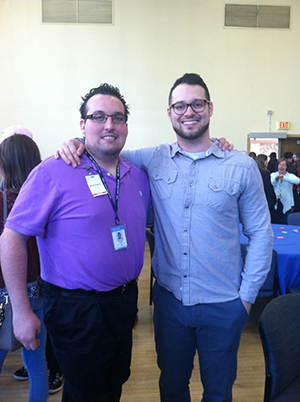It's a Small World (GA UCEDD/LEND)
August 8, 2016

|
By DJ Roberts,
Center for Leadership and Disability
at Georgia State University
"It's a small world." This phrase typically refers to events that are related in often unexpected ways. While I have heard and used this phrase many times throughout my life, a recent series of events led me to a new and personal appreciation for just how small our worlds can be. Allow me to explain:
Jane Roberts, my mother, is a professor in the School of Psychology program at the University of South Carolina. In her current position as program director, she has received nearly 20 million dollars in grants to forward her work and passion for supporting individuals with disabilities - specifically people on the autism spectrum.
My mom's career started as a school psychologist in an elementary school in South Florida where she applied her expertise in mental health to help children succeed academically, socially, behaviorally, and emotionally. Kenneth Kelty was one of those students. Twenty-three years ago, when he was three years old, Kenneth was exhibiting rather severe learning and behavioral impairments, and his parents were in search of answers and direction. In an initial evaluation, an expert had informed Kenneth's family that he would likely never speak and that they should have low expectations for his future. While it is difficult for parents of children with disabilities to hear that their child is "atypical" or "not like his classmates", hope for a child's future is often as critical, or more, critical than the actual diagnosis. In the follow-up assessment by my mother, Kenneth was diagnosed as having an autism spectrum disorder. However, in this heavy and emotional moment, my mother provided the diagnosis along with comfort and optimism to Kenneth's family and encouraged them to hope for the best for their child.
Now, more than twenty years later, small worlds collide. Kenneth tracked down my mother and found out that she was now a professor and still committed to improving the lives of young children with autism. He reached out to her to thank her for the hope that she provided to his family so many years ago. He wanted her to know that he is doing well and that he had been invited to speak at a conference on inclusive postsecondary education (IPSE) that was being held at Georgia State University (GSU) in Atlanta, and sponsored by the Center for Leadership in Disability. Kenneth is now a published author and a motivational speaker. He is also a recent graduate of the IPSE program at Western Carolina University where he attended classes and became involved in various student organizations. At the university, he gave campus tours and participated on a research team. He was also employed as an intern in an accounting office and is currently working as an administrative assistant and self-advocate for the Arc of the Triangle in Raleigh, North Carolina. Kenneth's skillset and passion for advocacy led him to become a trainee in the Leadership Education in Neurodevelopmental Disabilities and Related Disorders (LEND) at the University of North Carolina, where he currently attends distinguished talks and mentors high school students in advocacy.
My mother was amazed that her "old life" as a practicing school psychologist had been reintroduced to her current life as a university professor so many years later. She had a vague memory of Kenneth as a dark-haired boy with a caring family. My mother was deeply touched by Kenneth's report on how well he was doing and that the supportive way she provided the diagnosis to his family had been such an influence. Little did Kenneth and his family know that they had also made an impact on my mother; It was families and students like Kenneth's that inspired her to go back to graduate school and get her Ph.D., which led to her second career in research and training of future school psychologists.
The impact continues with me. I am currently pursuing my doctorate in School Psychology at GSU. Like Kenneth, I am also a LEND Center for Leadership in Disability trainee who is passionate about advocating with and for individuals with disabilities. A major focus of my research is IPSE, and as a part of my LEND experience I was a member of the planning committee for the IPSE conference that Kenneth attended. At the conference, I had the good fortune to meet and spend time with Kenneth and his mother. I am in awe of the humble, successful man that he has become - but perhaps not really surprised given his family's support and his determination. My LEND experience has provided me with knowledge, insight, and connections to so many incredible people. It is clear that Kenneth's Western Carolina and LEND experiences have helped Kenneth in many ways.
LEND bridged the connection between Kenneth and me, allowing for a moment that solidified my interests in a special way and motivated me to advocate even harder. I gained a renewed appreciation for my mother and her commitment to helping families. I am impressed by Kenneth and his willingness to fight for what he believes is true. And, I thank our LEND programs for providing us both with excellent training to advocate with persons with disabilities.
I will close with saying that it's a small world but, you already know that.







